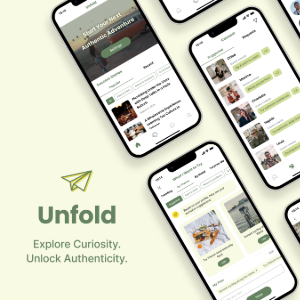Jessie's Master's design project presents Unfold, a mobile app service that uses UX and AI to move past sightseeing, linking curious travellers directly with locals for authentic, shared experiences and deeper cultural understanding.
Do you travel to tick off landmarks or to truly connect?
I love travelling! During a solo trip to Ireland in 2018, I hitchhiked and used couchsurfing.com to find places to stay. Talking to my hosts and briefly sharing their everyday life gave me a deeper appreciation of their culture and values.
This adventure made me realise that travel can be far more meaningful than simply sightseeing. Since then, I’ve sought to connect more deeply with the places I visit by really engaging with the people who live there.
This inspired my project – particularly when I discovered that I’m not alone. There is rising demand for a deeper travel experience, especially among younger travellers.
What was the core problem you wanted to solve for these "deeper" travellers?
It can be difficult and daunting to embark on this kind of immersive trip. The idea of Unfold began to take shape – an app connecting travellers and locals through trying something new together.
Unfold users set their availability and the activities they want to try, supported by Unfold’s AI assistant that suggests novel experiences for self-discovery.
The system then recommends compatible profiles – including interests, values, and reviews, helping them build a sense of who they might meet before sending a connection request.
Once connected, Unfold’s AI assistant offers editable conversation prompts, making it easy to start chatting and co-plan the meetup.
After each meetup, users can share reviews and success stories, while Unfold records their milestones – the places they’ve visited and the people they’ve met – encouraging reflection and personal growth.
How did you use your UX and Service Design knowledge to build the Unfold concept?
Creating Unfold put all my user experience (UX) and service design framework knowledge to the test. The hands-on practice – in defining the project scope, researching, designing, testing and gathering feedback to inform iteration – gave me the chance to apply my theoretical knowledge and approach the challenge systematically.
My initial secondary research helped me to identify and scope the challenges faced by immersive travellers. I followed this up with primary research, interviewing potential users of Unfold to explore their behaviours, attitudes and requirements.
Analysing this data generated the insights which informed my UX vision. Further ideation eventually led to my core concept – "trying something new". Meeting this spirit of adventure and curiosity became my project goal.
What was the most significant finding from your user interviews?
At this point, I developed the concept into a low-fidelity prototype app and tested it with users.
Testing with real users gave me invaluable insights into their behaviours and needs as well as their pain points. This helped me develop a stronger sense of how to validate a concept efficiently while keeping user needs at the heart of my design.
I continued to refine the app across mid- and high-fidelity prototypes, incorporating feedback at each stage. Finally, I mapped the service design – including its ecosystem, roadmap and value propositions – to ensure a holistic and sustainable solution.
What was the biggest challenge in designing the service roadmap for Unfold?
If I were to continue developing Unfold, I would test it with a broader audience to refine the concept. I’d also engage with stakeholders – like travel platforms or tourist boards – to explore potential collaborations and widespread adoption.
However, I’m now ready to put my degree to use in the workplace and am keen to secure a job that makes full use of my knowledge and experience.
Visit the School of Design and Creative Arts' Postgraduate Showcase to explore more designs like this.
